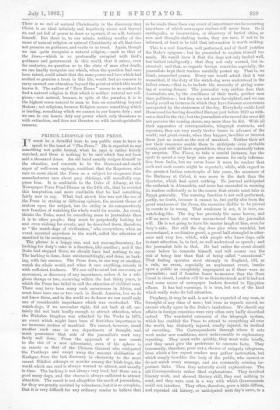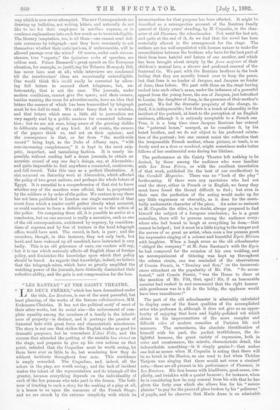PRINCE. LEOPOLD ON THE PRESS.
IT must be a dreadful bore to any public man to have to speak to the toast of "The Press." He is expected to say something not quite formal, what he says is rather keenly watched, and there is nothing to be said which has not been said a thousand times. An old hand usually resigns himself to the situation, and consents to be the thousand.-and-oneth sayer of well-worn sayings, confident that the Reporters, who care no more about the Press as a subject for eloquence than manufacturers care about grey shirtings, will mercifully sup- press him. It is creditable to the Duke of Albany, at the Newspaper Press Fund Dinner on the 24th ult., that he resisted this temptation, and, more creditable that he had something fairly new to say. What had struck him was not the use of the Press in stating or diffusing opinion, the ancient theme of orators upon the subject, but its utility in its comparatively new function of watching the whole world for events. An event, thinks the Duke, must be something more to journalists than it is to other people ; they must be perpetually looking for and even wishing for events, and he described them, therefore, as "the watch-dogs of civilisation," who everywhere, when an event occurred anywhere in the world, called the attention of mankind to its occurrence.
The phrase is a happy one, and not uncomplimentary, for barking for duty's sake is a function, like another ; and if the Duke had stopped there, we should have had nothing to say. The barking is done, done unintermittingly, and done, as bark- ing, with fair success. The Press does, in one way or another, watch the whole world, and when it sees anything, records it with sufficient loudness. We can call to mind but one event, or movement, or discovery of any importance, unless it be a reli- gious change or two, occurring within the last thirty years, to which the Press has failed to call the attention of civilised man. There may have been many such occurrences in Africa, and must have been one or two such in South America, but we do not know them, and in the world we do know we can recall only one of considerable importance which was overlooked. The watch-dogs, if we remember right, did not bark at all, cer- tainly did not bark loudly enough to attract attention, when the Wahabee kingdom was attacked by the Turks in 1870, an event which might have been of first:class importance to an immense section of mankind. We cannot, however, recall another such case in any department of thought, and must pronounce that side of the journalist's work very fairly well done. From the approach of a new comet to the rise of a new adventurer, even if his sphere is so remote as that of the Chinese General who extirpated the Panthays and swept away the nascent civilisation of Kashgar, from the last discovery in electricity to the most recent Nihilist attempt or murder among the Irish bogs, the world which can read is always warned to attend, and usually in time. The barking is not always very loud, but there are a good many dogs, and the chorus is always sufficient to attract attention. The result is not altogether the merit of journalists, for they are greatly assisted by volunteers ; but it is so complete, that it is very difficult for any ordinary reader to believe that as he reads these lines any event of importance can be occurring any where of which newspaper readers will never hear. Be it earthquake, or insurrection, or discovery of buried cities, or new and thought-shaking books, they are sure, if not to be informed, at least to be told that information is worth seeking.
This is a real function, well performed, and of itself justifies the Duke's epigram ; but he proceeded to explain himself too much. He would have it that the dogs not only barked well, but barked intelligently ; that they not only warned, but in- etructed ; and that, as regards foreign countries especially, the journalists kept their readers carefully posted up. That is, we think, unmerited praise. Every one would admit that it was unmerited, if the duty of the watch-dog were understood in the fullest sense,—that is, to include the necessity of giving warn- ing of coming danger. The journalist very seldom does that. Journalists are, by the conditions of their trade, quicker men than politicians; but they are not more far-sighted, and we can hardly recall an instance in which they have foreseen occurrences unexpected by the statesmen of the day. Everybody scolds Lord Hammond for having described Europe just before 1870 as with- out a cloud in the sky; but the journalists who record the error did not perceive the coming storm, any more than he did. With all their apparatus of correspondents, telegraph contracts, and reporters, they are very rarely twelve hours in advance of the world ; and great events, when they happen, bewilder or interest them just as much as the rest of mankind. Neither their art nor their resources enable them to anticipate even probable events, and with all their expenditure, they are constantly taken by surprise. The Tinter, to take a crucial instance, has the spirit to spend a very large sum per annum for early informa- tion from India, but we never knew it warn its readers that such and such events might be expected; while, with regard to the greatest Indian catastrophe of late years, the massacre of the Embassy at Cabal, it was more in the dark than the Spectator, which had spent nothing. No journal anticipated the outbreak in Alexandria, and none has succeeded in warning its readers sufficiently as to the course that events must take in Egypt generally. The warning function is not well performed, partly, no doubt, because it cannot be, but partly also from the great weakness of the Press, the excessive dislike to be proved by events to be wrong. That weakness is not, it is true, un- watch-dog-lihe. The dog has precisely the same horror, and will no more bark out when unconvinced than the journalist will, He is not going to have his master laugh at him, even for duty's sake. But still the dog does give when watchful, but unconvinced, a meditative growl, a growl half-strangled in utter- ance and very low, which, with people who know dogs, calls instant attention, is, in fact, as well understood as speech ; and the journalist fails in that. He had rather the event should, occur before he commits himself, and will sooner run the risk of being late than that of being called "sensational." That feeling operates most strongly in England, till, as a rule, an event, especially an unpleasant event, breaks upon a public as completely unprepared as if there were no journalists ; and if London hears to-morrow that the Suez Canal is closed, London will be as thunderstruck as if it had not read some scores of newspaper leaders devoted to Egyptian affairs, It has had warnings, it is true, but not of the kind which really wake its full attention.
Prophecy, it may be said, is not to be expected of any man, or foresight of any class of men ; but 'even as regards record, we cannot wholly agree in the Duke's laudations. We should say affairs in foreign countries were very often very badly described indeed. The wonderful extension of the telegraph system, which has enabled the Press to attend to everything all over the world, has distinctly injured, cruelly injured, its method of recording. The Correspondents through whom it acts work under new conditions, most unfavourable to explanatory reporting. They must write quickly, they must write briefly, and they must give the preference to concrete facts. They incessantly, therefore, pour out a shower of snippety telegrams, from which a few expert readers may gather instruction, but which simply bewilder the body of the public, who cannot or do not watch every message, and are constantly missing im- portant links. Then they naturally avoid explanations. The old Correspondents rather liked explanations. They involved literary work, and showed literary skill, they cost nothing to send, and they were sent in a way with which Governments could not interfere. They often, therefore, grew a little diffuse, and repeated old, history, or anticipated next day's news, in a
way which is now never attempted. The new Correspondents are drawing up bulletins, not writing letters, and naturally do not like to ins, lye their employers in nee3less expense, or to condense explanations into such few words as to he unintelligible. The literary temptation, too, is off them—one cannot send deli. cate sentences by telegraph—and they have constantly to ask themselves whether their anticipations, if unfavourable, will be allowed passage over the wires P Of course, under such circum- stances, true "reports." the ipsissinta verba of speeches, are seldom sent. Prince Bismarck's great speech on the European situation, for example, as justifying his Tobacco Monopoly Bill, has never been sent at all; while interviews are condensed till the interlocutors' ideas are occasionally unintelligible. One would think this could easily be corrected by allow- ing full letters to succeed short telegrams, but, un- fortunately, that is not the case. The journals, under modern conditions, cannot give the space ; and their owners, besides wanting the room for advertisements, have an idea that letters the essence of which has been transmitted by telegraph must be too dull to read. We ratber fancy that is a mistake, and that letters which seem a little old to journalists are very eagerly read by a public anxious for connected Informa- tion; but we are not sure, being aware of the growing dislike to deliberate reading of any kind. At all events, the owners of the papers think so, and act on their opinion ; and the consequence is that, so far from "the world-wide record" being kept, as the Duke of Albany says, "with ever-increasing completeness," it is kept in the most snip- pety, imperfect, and tantalising fashion. It is nearly im- possible, without reading half a dozen journals, to obtain an accurate record of any one day's doings, say, at Alexandria; and quite impossible to find anywhere a connected, continuous, and full record. Take this case as a perfect illustration. A riot occurred on Saturday week at Alexandria, which affected the policy of two great nations, and perhaps the whole future of Egypt. It is essential to a comprehension of that riot to know whether any of the murders were official, that is, perpetrated by the soldiers or by order of the police. We venture to say there has not been published in London one single narrative of that event from which a reader could gather clearly what occurred, or could venture to form a definite opinion as to the action of the police. On comparing them all, it is possible to arrive at a conclusion, but no one account is really a narrative, such as one of the old correspondents, unfettered by urgency, by considera- tions of expense, and by fear of traitors in the local telegraph office, would have sent. The record, in fact, is poor ; and the recorders, though, in this instance, they not only bark, but howl, and have wakened up all mankind, have instructed it very badly. This is an old grievance of ours, our readers will say, • but it is one which seriously affects all English ideas of foreign policy, and diminishes the knowledge upon which that policy should be based. As regards that knowledge, indeed, we believe that the telegraph-wires, which have so greatly amplified the watching power of the journals, have distinctly diminished their reflective ability, and the gain is not compensation for the loss.



































 Previous page
Previous page